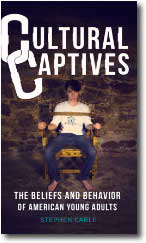More Cultural Research from Steve Cable
In my book, Cultural Captives, I talk about the state of pluralistic beliefs among American young adults. Pluralism is the belief that there are multiple ways by which one can obtain eternal life, e.g. Christianity and Islam both provide valid paths to eternal life. Looking across multiple surveys taken from 2005 through 2010, I found that approximately 90%
of young adults who were not evangelical ascribed to pluralistic beliefs. Among those young adults who were evangelical (or born again depending upon the survey), the percentage dropped to about 70%. So, in the first decade of this century, the vast majority of young American adults believed that there are multiple ways to reach heaven.
Has that position changed over the last six years? To answer this question, I analyzed data from two newer surveys: the Portraits of American Life Survey 2012{1} and the Faith Matters Survey 2011{2}. In the PALS survey, if a person disagreed strongly with the following two statements, we categorized them as not pluralistic:
1. It doesn’t much matter what I believe so long as I am a good person.
2. The founder of Islam, Muhammad, was the holy prophet of God.
In the Faith Matters survey, if a person agreed strongly with the following statement, we categorized them as not pluralistic:
1. One religion is true and others are not.
Using these survey questions, we found the following:
For 18- to 29-year-olds, emerging adults who were not evangelical, we found that 93% were pluralistic according to the PALS and 91% were pluralistic according to the Faith Matters survey. For those who are evangelical, the numbers were 76% and 77% respectively. These numbers are slightly higher than the numbers I reported in 2010. But, the number were
already so high in 2010, these new numbers just continue a trend. The PALS survey indicates that for those thirty and over the number of evangelicals who are pluralists drops to 64%, which is still a disturbing majority of those who are called to evangelize their fellow citizens.
The apostle Peter told the Jewish Sanhedrin under the threat of imprisonment or death, “This Jesus is the stone that was rejected by you, the builders, which has become the cornerstone. And there is salvation in no one else, for there is no other name under heaven given among men by which we must be saved.” (Acts 4:11-12)
God chose to send His Son to die for our sins because there was no other way to provide forgiveness for our sins. Many Americans claiming to be evangelical Christians do not seem to appreciate that the great sacrifice God made for us is not one of many ways to reconciliation. As Jesus told us, “I am the way, and the truth, and the life. No one comes to the Father except through me.” (John 14:6)
Notes
1. Data downloaded from the Association of Religion Data Archives, www.TheARDA.com, and were collected on behalf of Emerson, Michael O., and David Sikkink. Portraits of American Life Study, 2nd Wave, 2012.
2. Data downloaded from the Association of Religion Data Archives, www.TheARDA.com, and were collected on behalf of Harvard University and the University of Notre Dame, principal investigators: Robert Putnam, Thomas Sander, and David E. Campbell.
© 2016 Probe Ministries














